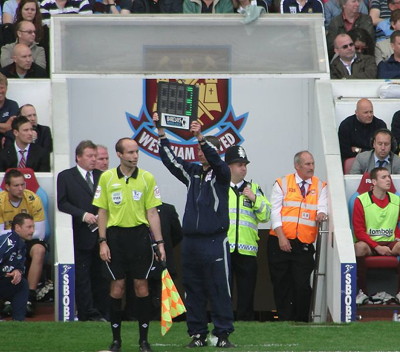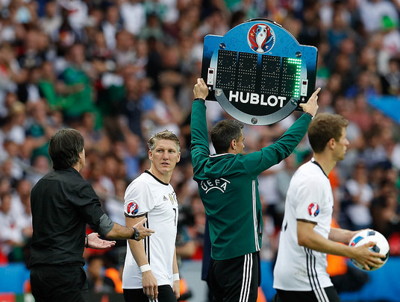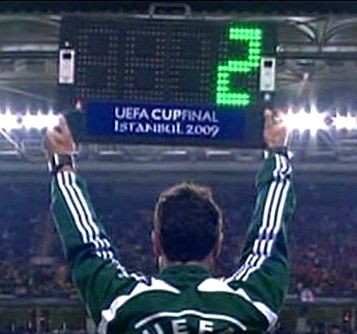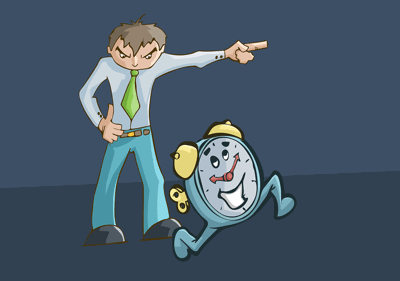
Sometimes called Stoppage Time, occasionally referred to as Added Time, Injury Time in association football is the time that the referee adds to the end of each half of a game.
There are a number of things that can cause this time to be added, not just injuries, which helps to explain the different names that are used for it by various people who talk or write about football.
The idea of ‘Fergie Time’ when Alex Ferguson was the manager of Manchester United was based around the idea that his team got however long it needed to score a winning goal.
It’s a somewhat apocryphal notion, but it is so ingrained into football supporter’s psyche that it remained in use well after his retirement. Here’s a look at how stoppage time works in football.
Determining Added Time

The first thing that we need to know is what a referee will take into account when adding time to the end of each half of football.
According to the Football Association, time is added on for all of the following:
- Substitutions
- Assessment of injured players
- Removal of injured players
- Time wasting
- Disciplinary sanctions being issued
- Any medical stoppages allowed by the rules, such as those for a drinks break
- Any delays added for VAR checks
Other causes deemed relevant by the referee, such as a streaker or excessive goal celebrations
As each half of football approaches, the fourth official is tasked with displaying the minimum amount of time that the referee has told him will be added to the period. It is important to note that this is the minimum added time; a referee can decide to play more than the time indicated but not less than it.
In the event that a penalty is given during stoppage time, the half is extended until the penalty is completed. This includes occasions when the penalty has to be retaken for some reason.
Why Stoppage Time Matters

It might seem like injury time is a bit of a silly addition to the end of a half of football, especially as very few referees actually seem to add on an amount that reflects true stoppages during the game. Yet it is a crucial part of football, with the site Pinnacle suggesting that in 2014 as many as 11.3% of all goals scored came during stoppage time.
With the period added coming at the end of each half, and therefore the end of the match itself, it’s when teams needing a goal push to try and score it. This, in turn, leaves them open to counter-attacks from the defending side, which is doubtless why so many goals are scored during the final few minutes of the match that the referee has added on.
Research into La Liga in Spain by Luis Garcicano, Ignacio Palacios and Canice Prendergast of the National Bureau of Economic Research showed that referees tend to favour the home side when it comes to stoppage time. In their paper, ‘Favouritism Under Pressure’, they show that referees ‘systematically favour home teams by shortening close games where the home team is ahead, and lengthening close games where the home team is behind’.
Time Keeping Isn’t Perfect
 One thing that frustrates football fans immensely is the fact that time keeping in matches isn’t a perfect science. The amount of time added onto a game can vary wildly from referee to referee, with the main in the middle being the sole arbiter of what constitutes time that should be added on. Even the laws of the game are decided vague on the issues.
One thing that frustrates football fans immensely is the fact that time keeping in matches isn’t a perfect science. The amount of time added onto a game can vary wildly from referee to referee, with the main in the middle being the sole arbiter of what constitutes time that should be added on. Even the laws of the game are decided vague on the issues.
Yes, they say that the clock should be stopped for time wasting, but what is time wasting, exactly? A goal-kick isn’t included in the list of things that stoppage time is added for, yet it can take an age for one to be taken. The likes of Ben Foster are masters at wasting time over goal-kicks, moving the ball’s placement, pulling up their socks and so on.
Equally something like a throw-in isn’t on the list of things that a referee is supposed to add time onto a match for, meaning that players can happily waste time instead of getting the ball back into play if they want to. Yes, there is a fine line between wasting time and just trying to get on with the game, but if a referee doesn’t pick players up on it then the clock keeps ticking down.
Many a football supporter has been frustrated when watching a match referee indicate to a goalkeeper that they know that they’re wasting time without seemingly adding that time back on to the game. That’s to say nothing of those who tell goalkeepers off for ninety minutes but don’t actually book them for the time wasting until there’s only a few minutes left to play.
Injury Time Is Not Accurate
 During the World Cup back in 2018, the statistical analysis website FiveThirtyEight decided to take a look at the amount of stoppage time being added to games. They analysed 32 matches, noting a total of 3194 stoppages. That was the equivalent of a stoppage every 58 seconds of a game. What they discovered was something that will surprise very few people.
During the World Cup back in 2018, the statistical analysis website FiveThirtyEight decided to take a look at the amount of stoppage time being added to games. They analysed 32 matches, noting a total of 3194 stoppages. That was the equivalent of a stoppage every 58 seconds of a game. What they discovered was something that will surprise very few people.
During those 32 World Cup matches, an average of 6 minutes and 59 seconds was added at the end of the halves. Using FIFA’s own guidance on the matter, FiveThirtyEight believed that the actual average time that should have been added was 13 minutes and 10 seconds. Stoppage time, then, was roughly half what it actually should have been.
It’s certainly time wasting that causes the most confusion, given each referee will interpret it differently and add time accordingly. Yet FiveThirtyEight’s research suggested that even the most basic of things that were easily identifiable, such as substations, averaged 5 minutes more than referees were actually adding to the end of each half.
The organisation even allowed a certain amount of ‘natural’ time before it was adding time to their stoppages. The ‘natural’ time was based on the average length of time taken for each activity, which were as follows:
| Event | Average Time Taken In Seconds |
|---|---|
| Throw-in | 20 |
| Warning | 30 |
| Goal-Kick | 30 |
| Corner Kick | 45 |
| Free-Kick | 60 |
| Penalty | 60 |
| Altercation | 30 |
| Arguing With Offical | 30 |
In other words, if there was a penalty given and it took 2 minutes to be taken, only the second minute would be counted as an ‘excessive stoppage’. With an average of 75 stoppages in play per match, that’s an awful lot of ‘excessive stoppages’ being missed off by officials that take charge of matches, if we assume the World Cup is fairly representative.
Where Is Times Wasted The Most?
| Event | Average Number Of Minutes & Seconds Per Match | Percentage Of Total Play |
|---|---|---|
| Throw-in | 7.5 | 8.1 |
| Warning | 0.17 | 0.3 |
| Goal-Kick | 6.03 | 6.2 |
| Corner Kick | 4.14 | 4.4 |
| Free-Kick | 10.29 | 10.8 |
| Penalty | 0.33 | 0.6 |
| Altercation | 0.05 | 0.1 |
| Dissent | 0.36 | 0.6 |
| Injury | 4.10 | 4.3 |
| Substitution | 3.03 | 3.1 |
| Goal Celebrations | 2.55 | 3 |
| Booking | 0.55 | 0.9 |
| VAR | 0.31 | 0.5 |
Again, assuming that the World Cup in 2018 is a far reflection of most football matches, which it probably is considering the Video Assistant Referee system was in place for the tournament, FiveThirtyEight’s research shows that the biggest amount of time is wasted on free-kicks. They took up an average of 10 minute and 29 seconds per match.
Compare that to altercations, which took up the least amount of time at an average of 5 seconds, and you can see what a difference it makes when referees get their timing right. The table above shows the averages:
It’s crazy to think that as much as eight minutes worth of a match is spent waiting for a throw-in to be taken, but that’s what the FiveThirtyEight research into the matter showed.
What Is The Future Of Stoppage Time?
 Since the introduction of the Video Assistant Referee to professional football matches in the likes of the Premier League and the Champions League, there has been a call for the monitoring of stoppage time to be taken away from the referee. Indeed, Alex Ferguson suggested it more than once during his time as manager of Manchester United.
Since the introduction of the Video Assistant Referee to professional football matches in the likes of the Premier League and the Champions League, there has been a call for the monitoring of stoppage time to be taken away from the referee. Indeed, Alex Ferguson suggested it more than once during his time as manager of Manchester United.
Considering noting stoppages should be the easiest job for an official to do, it’s concerning how often referees seem to get it wrong. It is something that has been considered numerous times over the years, but in order for the International Football Association Association Board to consider taking the change, the panel would need to be presented with evidence that it would improve things.
It is a regular occurrence that a newspaper will run a story that suggests that IFAB is considering changing the length of football matches in order to combat time wasting, but it very rarely actually happens. Back in 2017, for example, the Guardian had a piece saying that matches may be reduced to being 30 minutes per half, with the clock stopped each time the ball was out of play.
